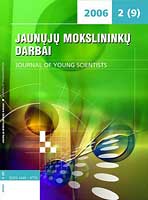Galimybės plėtoti Lietuvos žinių ekonomiką panaudojant ES struktūrinius fondus
Knowledge Economy Development Opportunities in Lithuania through EU Structural Funds
Author(s): Kęstutis Kriščiūnas, Erika Eičaitė, Auksė NorkuvienėSubject(s): Economy
Published by: VšĮ Šiaulių universiteto leidykla
Keywords: Knowledge economy; EU Structural funds; Common Programming Document.
Summary/Abstract: The article analyses the knowledge economy development tendencies in the aspect of the evolution of economic theories, describes the emergence of basic threats, preconditions for and mechanisms of the knowledge–based economy. The knowledge economy is a new economic phenomenon of the 20th century. The knowledge economy includes the country’s all spheres: economic, social and cultural. A stable economy is the most important measure of the knowledge economy implementation: it strengthens economic and social basis, fosters innovations, invests in human capital. Lithuania has enough potential for developing the knowledge economy: macro economic situation in the country is stable, competition is growing, the network of educational institutions has been formed and knowledge is good, etc. One of the most perspective ways is financial aid from EU Structural funds. It is determined by two factors: pragmatic Common Programming Document in Lithuania and projects developed according to the regulations of Common Programming Document.
Journal: Jaunųjų mokslininkų darbai
- Issue Year: 2006
- Issue No: 2(9)
- Page Range: 18-22
- Page Count: 5
- Language: Lithuanian

